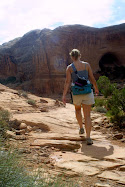
Sitting in the living room, admiring our newly lit tree, and feeling all cozy...can it really be Christmas time again? We held a Christmas pageant, went to see Santa, hung the stockings, and decorated the tree. The traditions are rich, the years have imprinted them on our souls and into our hearts. This time of year is ripe with nostalgia, hope for the future, and meandering through the past. And now we begin to imprint new beings, new souls with the traditions. And with the onslaught of consumerism knocking at our door, the songs singing love to Santa and hope for presents we look and search to remind ourselves and our children of why our family celebrates Christmas. And the riches we seek are far greater than any tradition or boutique can offer.
Sitting around our home is a wonderful book of poems by a woman who I believe has taken the story of our world and woven from it new stories and images that speak to the core of my heart. I have read some of her fiction, the Wrinkle in Time series, and fell in love with her scientific views of the soul. She intertwines science, faith, mystery, and fantasy so well and her poetry also reflects that. So I'm going to share a poem, more like a short story, of hers that spoke to me regarding this season we are upon, this season of gifts. It's not really a nativity poem, it speaks less of the holy one born and more of the state we find ourselves in as human beings. And in a year where war is still waging, where the hungry stay hungry, where children are dying, and the earth itself is heaving, my soul looks as does the woman in the poem, looks for the balance to shift. I am reminded of what I am celebrating this Christmas season, not just the birth of God incarnate, that's said so flippantly, but what I want to get at is beyond celebrating a birthday, it's more, it's recognizing the coming of the kingdom of heaven, it's redemption of humanity. And so we wait in a world that is still full of cruelty, we hold our breath with a hoping only made possible by this birth we celebrate, hoping for the world to be made new.
Here is it, by Madeleine L'Engle, Eve.
When we left the garden we knew it would be forever.
The new world we entered was dark and strange. Nights were
cold.
We lay together for warmth, and because we were afraid
of the un-named animals, and of the others: we had never
known about the giants, and angels gone wild. We had not been
told
of dwarves and elves; they teased us; we hid whenever they played.
Adam held me. When my belly grew taut and began to swell
I didn't know what was happening. I thought it was the beginning
of death, the very first death. I clung to Adam and cried.
As I grew bigger something within me moved. One day I fell
and the pains started. A true angel came and pushed the grinning
creatures back. Adam helped. There was tearing. I thought I'd
died.
Instead, from within me came a tiny thing, a new creature,
red-faced, bellowing, mouth groping for my breast.
This was not death, but birth, and joy came to my heart again.
This was the first-born child. How I did laugh and sing!
But from this birth came death. He never gave me any rest.
And then he killed his brother. Oh, my child. Oh, my son Cain.
I watched from then on over every birth,
seeing in each babe cruelty ready to kill compassion.
For centuries the pattern did not change. Birth always meant death.
Each manchild who was born upon the longing earth
in gratefulness and joy brought me only a fresh ration
of tears. I had let hate into the world with that first breath.
Yet something made me hope. Each baby born
brought me hurrying, bringing, as in the old tales, a gift
looking - for what? I went to every slum and cave and palace
seeking the mothers, thinking that at least I could warn
their hearts. Thus perhaps the balance might shift
and kindness and concern replace self-will and malice.
So I was waiting at that extraordinary intersection
of Eternity and Time when David's son (Adam's too)
was born. I watched the Incarnate at his mother's breast
making, by his humble, holy birth the one possible correction
of all that I by disobedience had done. I knelt and saw new
Adam, and I cried, "My son!" and came at last to rest.
